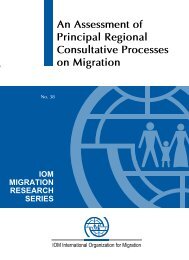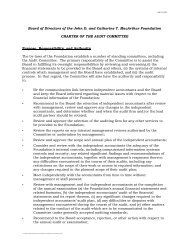A Global Compact on Learning - Brookings Institution
A Global Compact on Learning - Brookings Institution
A Global Compact on Learning - Brookings Institution
You also want an ePaper? Increase the reach of your titles
YUMPU automatically turns print PDFs into web optimized ePapers that Google loves.
if the quality of service is poor, learning outcomes<br />
will also be poor. Therefore, complementary interventi<strong>on</strong>s<br />
are also needed to improve the quality of<br />
learning.<br />
The sec<strong>on</strong>d needed acti<strong>on</strong> is to provide a safe envir<strong>on</strong>ment<br />
and girl-friendly school policies. 182 Often,<br />
young people, especially girls, are unable to attend<br />
sec<strong>on</strong>dary school due to security and safety c<strong>on</strong>cerns.<br />
Sec<strong>on</strong>dary schools are usually further away<br />
from home than primary schools; and as girls enter<br />
puberty, they face increased risks, including sexual<br />
and gender-based violence. A recent study in Nigeria<br />
found that for boys and girls combined, living<br />
20 minutes or more from the nearest sec<strong>on</strong>dary<br />
school reduces the odds of school attendance<br />
by 52 percent, with girls being disproporti<strong>on</strong>ately<br />
affected by school distance. 183 Strategies that have<br />
shown to enhance the safety and security of girls in<br />
particular, and promote a more girl-friendly envir<strong>on</strong>ment<br />
include: the presence of female teachers;<br />
the proximity of schools to girls’ homes; the availability<br />
of boarding facilities and transportati<strong>on</strong><br />
where schools are l<strong>on</strong>g distances from communities;<br />
and clearly communicated and enforced codes<br />
of c<strong>on</strong>duct for students, teachers, and school pers<strong>on</strong>nel.<br />
184 Uganda has had some success in reducing<br />
tolerance for sexual harassment in school through<br />
public campaigns and raising awareness of the issue<br />
of sexual harassment by prominent women and<br />
men, al<strong>on</strong>g with threatening harsher punishment<br />
for violati<strong>on</strong>s, including impris<strong>on</strong>ment. 185 Teachers,<br />
both male and female, should receive gender-sensitive<br />
training so that they have equal expectati<strong>on</strong>s<br />
of boys and girls in the classroom and give equal<br />
class time and support to both. This includes working<br />
with teachers to end stereotypes and practices<br />
that discourage female students from certain areas<br />
of study, such as mathematics and science. School<br />
curricula should be reviewed to remove harmful<br />
stereotypes that reinforce unhealthy and discriminatory<br />
practices and replace them with positive examples<br />
of gender equality. In Malawi, the Ministry<br />
of Educati<strong>on</strong>, Science, and Technology established<br />
the Gender Appropriate Curriculum unit to make<br />
primary and sec<strong>on</strong>dary textbooks more gender<br />
sensitive and to portray girls and women in more<br />
positive roles. Training has also been provided for<br />
school textbook writers and editors and for some<br />
teachers to make their work gender sensitive. 186<br />
Schools and teachers should also be linked with<br />
community-based initiatives to combat genderbased<br />
violence, given that much work is being d<strong>on</strong>e<br />
at community levels in many countries that are generally<br />
not well linked with schools.<br />
The third needed acti<strong>on</strong> is to cultivate community<br />
support and encouragement for <strong>on</strong>going learning<br />
for both girls and boys. Community mobilizati<strong>on</strong><br />
and support networks can also play an important<br />
role in ensuring that young people make the transiti<strong>on</strong><br />
to and complete sec<strong>on</strong>dary school. The media,<br />
religious leaders, and other influential community<br />
members can communicate with parents<br />
and caregivers about the importance and benefits<br />
of educati<strong>on</strong>, especially for girls. This may require<br />
gender sensitizati<strong>on</strong> and girls’ educati<strong>on</strong> awareness<br />
programs with the community to challenge social<br />
norms that are biased against girls learning. For example,<br />
in Malawi, which faces high dropout and absenteeism<br />
rates am<strong>on</strong>g adolescent girls, a Save the<br />
Children project established Bright Future Committees<br />
to help keep girls in school. The committees,<br />
comprising equal male and female representatives—including<br />
students, teachers, parents, PTA,<br />
school management, and influential community<br />
members—led community-wide discussi<strong>on</strong>s <strong>on</strong><br />
the importance of sending girls to school and established<br />
guidelines to resp<strong>on</strong>d to absenteeism and<br />
sexual violence and abuse. The committees actively<br />
followed up <strong>on</strong> children, especially girls, when they<br />
dropped out of school to discuss with families the<br />
barriers to keeping the girl in school and problem<br />
solve with them <strong>on</strong> how they can address these barriers.<br />
As a result, there was an increase in parent–<br />
teacher and parent–student communicati<strong>on</strong> about<br />
girls’ progress, and the girls received greater support<br />
throughout their educati<strong>on</strong> careers. 187<br />
High-quality mentoring programs have also been<br />
associated with keeping more girls in school, with<br />
girls most disadvantaged or at risk benefiting most.<br />
Some studies reveal, however, that even when<br />
positive effects are found, mentoring programs<br />
A <str<strong>on</strong>g>Global</str<strong>on</strong>g> Compa c t <strong>on</strong> <strong>Learning</strong>: Taking Acti<strong>on</strong> <strong>on</strong> Educat i o n in Developing Countries<br />
C e n t e r for Universal Educat i o n at <strong>Brookings</strong><br />
35






